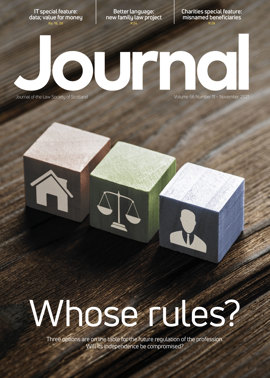The Word of Gold: The R word
In the teeth of the battle against COVID-19, we were transfixed by the “R” number, the rate at which infection was spreading. Above 1, it was accelerating; below and we had cause for hope. Now, as we lurch uncertainly towards something like the pre-pandemic world, R is once again centre stage, but this time it’s a word: Resilience.
In the last few weeks, we have seen motorists queuing round the block at forecourts, crops lying unpicked and rotting in the fields, animals culled because they cannot be taken to market, and HGVs lying idle for want of drivers. Just-in-time supply chains, once touted as modern marvels of efficiency, have shown how vulnerable they, and hence we, are to disruption. These threats to the UK’s national resilience play out in countless ways for businesses, as they do for individuals.
Recently, I sat on the judging panel for The Herald Law Awards of Scotland. Many different kinds of firm entered, all with inspiring stories. All of them, rightly, emphasised the resilience which enabled them to thrive through the pandemic. It is worth asking, what does it take to be resilient? These firms had many different answers, but common to all is that they began with a resilient mindset. Resilient people are honest about the problems facing them, confident they can be overcome, positive about the prospect of change, and alert to the opportunities change may bring. While they may hold to “traditional values” in the best sense, they do not cling for old times’ sake to an artisanal way of doing things. On the contrary, they welcome new technology, harnessing it to enhance the quality of their work, freeing themselves from the mundanities of their job and giving themselves the prospect of greater prosperity and a more enjoyable life.
Resilient businesses plan. They develop strategies which are thought through and clear about some fundamental questions. What is to be achieved? What are the crucial tasks? How will success be measured? What cash and other resources will be needed? What constraints are there, and how can they be overcome?
But they do more than plan; they execute. Law firms are often afflicted by SPOTS: Strategic Plans On The Shelf, but the best of them are as meticulous about execution as they are to the original conception.
As always, people matter most
Businesses may be likened to machines, but the people who work in them cannot. Every resilient business takes good care of its people. To be effective and settled, employees need a network of harmonious relationships, and a feeling that whatever their job title, they are respected, and heard. Businesses which invest in employee wellbeing are not only more resilient at times of crisis, they consistently achieve superior results.
Underpinning all of this is that resilient businesses think deeply about their values and purpose.
David Maister, the doyen of law firm management experts, proposed these values, and I don’t think they have ever been improved upon:
- We will make all decisions based on putting the clients’ interest first, the firm’s second and individuals’ last. We do not accept people who act in a self-interested way, to the detriment of clients or the firm.
- We will attain levels of client satisfaction that result in client referral becoming the major source of new business.
- We will have no room for those who put their personal interests above the interests of their team.
- We will design a reward system to reflect an assessment of overall contribution to the success of the firm, not just short-term individual performances.
- We will select, evaluate and remunerate those in managerial roles based primarily on the success of their group, rather than on individual performance.
- We acknowledge that individual billings may not be the most important measure of an individual’s contribution to the business.
- We will require, not just encourage, everyone to learn and develop new skills. The firm accepts its responsibility to help each individual achieve this.
- We acknowledge the individual and collective obligation to support through difficult business and personal challenges all colleagues who subscribe to this constitution and conduct themselves accordingly.
- We will individually and collectively, operate with a “stewardship” mentality towards our junior people, accepting the obligation to coach, mentor and develop those who report to us.
- We will work actively to deliver the whole firm. We accept a fundamental obligation to create opportunity for colleagues in every practice area, and are willing to be judged on our efforts.
- Collectively and individually, we will invest a significant amount of time and resource each year on things that will pay off in the future.
In the last two years, COVID-19 has tested our personal resilience to destruction. As we head into another winter, we can at least have confidence that “R” will not stand for “Repeat”.
Regulars
Perspectives
Features
Briefings
In practice
Online exclusive
In this issue
- Good legal software suppliers listen to you
- The trends that will shape law firms in 2022
- Technology won't solve everything...
- Key trends in legal tech adoption for UK law firms
- The top 4 benefits of moving to a cloud solution
- Why cyber risk management is not the same as IT support
- Business growth: finding the right package






